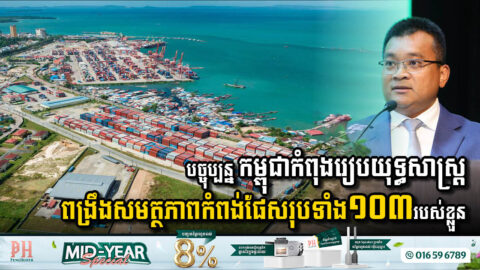Cambodia economic slowdown most affected in CLMV due to COVID-19
If we look at the economic situation of the lower middle-income countries in the ASEAN bloc or the so-called CLMV– Cambodia, Laos, Myanmar, and Vietnam, the COVID-19 crisis has pulled the economies of these countries’ down to around 3.4%, the lowest level in the last two decades.
Looking at the overall impact of COVID-19 on the CLMV economy, the economic structure of these countries depends largely on foreign sources of revenue – tourism and exports, according to the K Research Center Center.
Vietnam is the exception thanks to its solid economic foundation due to a strong local SME system and strong domestic production capacity, especially the installation of large international industrial plants.
Economically, Cambodia is likely to be the worst affected
Regardless of the rate of infection and death, in terms of economic impact, Cambodia is one of the worst affected. Two major analytical factors to support this claim are that the Cambodian economy depends heavily on foreign earnings through tourism and exports. Tourism is expected to decline by about 60% or even more this year.
In terms of exports, Cambodia still relies on European and US markets. Both the United States and the European bloc are currently most vulnerable to the spread of COVID-19.
All of Cambodia’s major export markets are among the hardest hit by COVID-19. These include the United States (US$3.06 billion), Germany (US$1.78 billion), the United Kingdom (US$1.3 billion), Japan (US$1.26 billion) and France (US$1.03 billion). Top importers are China (US$4.77 billion), Singapore (US$2.95 billion), Hong Kong (US$908 million), South Korea (US$603 million) and Indonesia (US$ 513milion), according to data from Export.gov and World Top Export.
In addition, the largest exports to the United States accounts for about 20% of Cambodia’s total exports, and the United States is also the most affected by the COVID-19.
Therefore, the export value for 2020 is projected to decline by 10%, leading to a 0.9% decline in the sector in the overall economy.
Thanks to its firm economic base, Vietnam’s growth rate will be 3.6% this year
Vietnam is less affected by the epidemic, as the country does not rely solely on its export earnings. In addition, Vietnam is self-reliant. Fortunately, Vietnam has many export trades partners that help the country diversify its risk very well. This is seen as a strength for the country, not only for coping the crisis, but also for the post-crisis period.
Vietnam’s main exports are light industrial and electronic products
Unlike Cambodia, most of Vietnam’s major exports are medium-sized industries. These products include consumer goods and electronics, and they meet the world’s economic needs during this pandemic crisis: changing consumer behaviour by working from home and maintaining social distance. This demand has led to an increase in demand for computer equipment and integrated circuits.
In addition, the Vietnamese government implemented a stimulus and tax reduction program to support its economy, which resulted in a slight drop in exports to about 5% of total export value.
Overall, it is expected that Vietnam will maintain its economic position at around 3.6% this year.
Myanmar’s exports fell by 10%
Myanmar’s economic core relies on natural gas exports, which has been hit hard by the continued decline in global fuel prices.
Myanmar’s second-largest export of garments and textiles has also been hit hard by the closure of factories in China and a slowdown in European markets. The value of Myanmar’s exports is projected to decline by 10% this year.
However, luckily, the EU has set up a €500 million urgent aid fund to help Myanmar’s textile industry, which is affected by COVID-19, is set to ease the pressure on labor and household consumption.
The EU’s Quick Aid Fund, which is worth about 1% of Myanmar’s GDP, has been found by most research institutions, including the K Research Center, as an effective measure to support its income and allow its consumption by Myanmar families, which is growing at a rate similar to the situation before the global crisis.
Overall, Myanmar’s economy is likely to grow better than Vietnam’s 4.3% by 2020. This is due to another major factor in addition to the quick assistance fund above, a plus with project investment in Myanmar’s infrastructure is expected to continue as planned.
Laos’ economy was the least affected, with growth of 3.9%
Laos’s luck is that its economy depends on exports from the extractive mining industry, and selling electricity. In these sectors, there is no need to employ too many people or works to operate.
Laos’ tourism depends largely on the arrival of Thai tourists. Given that Thailand is among the most vulnerable ASEAN countries, Laos’ tourism is likely to be adversely affected.
But based on revenue from energy sales, Laos is less dependent on exports of products and tourism. Tourism development is still in its infancy and a small part of the country’s GDP. As a result, income for most of the population remains unaffected, while household consumption continues to grow at a rate similar to income earned before the COVID-19 crisis.
In the construction sector, investment in the country’s high-speed rail project worth more than US$7 billion will continue as planned.
So far, Laos’ foreign direct investment (FDI) has been less affected, with a decline of about 5%, which is predicted to maintain 3.9% growth by 2020. This rate is slightly above Vietnam and slightly below Myanmar.
Overall, the CLMV economy: is likely to accelerate in the next one to two years. It is projected that the economies of the four lower middle-income countries will grow to 6.4% by 2021 and 6.5% by 2022.
In the meantime, any of these countries that rely heavily on foreign earnings or, in other words, solely rely on FDI, may face further negative effects during the crisis. And that is most likely Cambodia.
- Video Advertisement -



 ខ្មែរ
ខ្មែរ







